On the anniversary of Operation Varsity, an extraordinary gathering in a local restaurant in honour of US glider trooper John Kormann brought back memories, and evoked the sights and sounds of battle.
Operation Varsity, the Allied airborne drop across the Rhine, 24 March 1945:

First there was a “fürchterliche Kanonade”, a terrifying artillery barrage, a “Trommelfeuer” so intense and continuous that the detonations ran together like a drum roll. Thousands of guns on the other side of the river Rhine were sending their high explosive shells into every corner of the German farmland along its banks. In the middle of this inferno the RAF blasted apart the nearby town of Wesel, dropping massive bombs that made the earth shake. Suddenly the shelling stopped, and the stillness was almost more shocking than the uproar. It was a relief, but it also meant that heavily armed enemy soldiers were about to swarm through the fields and farms, killing as they came.
For the German children quaking in the root cellars of the farms, praying each moment that it was not to be their last, the bombardment and the horrors it brought in its wake were the culmination of months of helpless fear and anxiety. At night they went to bed fully clothed, their ears attuned to the sound of aero engines or distant sirens, in case they had to leap up and stumble half asleep to the shelter. They heard the bellows and screams of cattle burning to death, tethered in their stalls, when an incendiary bomb hit the stable. On their way to school they threw themselves flat in the mud when the much-feared “Jabos”, Allied fighter bombers, roared low over the fields.
Now the barrage was over. Now the enemy soldiers, American and British, would come. Downstairs, German women and children and foreign forced labourers were packed into the root cellars. Upstairs, German soldiers, forcibly billeted in the farms, had turned them into strongpoints. They fully expected an airborne assault, and all around the strongpoints the Germans had placed light and heavy “Flak” anti-aircraft guns. The Allied “Jabos” had been sent to destroy these guns, and the Allied artillery had attempted to smash them, but most of the guns survived.
In the stillness that followed the barrage, a new sound was heard. The drone of thousands of aircraft grew from a hum into a roar. Windows and doors began to rattle. Soon all hell broke loose, a “ganze Shiesserei”, a cacophony of shooting, the clatter of hundreds of anti-aircraft cannons firing at the transport planes and gliders. The aircraft were flying low and slow straight into the sights of the guns, and soon many were disintegrating in mid air, or engulfed in flame, or arcing out of control towards the ground.
Despite this, thousands upon thousands of enemy soldiers floated down on parachutes, or spilled out of gliders that had reached the ground. They quickly assembled and began to overwhelm the “Flak” emplacements and the fortified farms.
Among the enemy soldiers was American glider trooper Private John Kormann, a runner (messenger) with 517th Airborne Signal Company of the US 17th Airborne Division. Like many Americans, he was the child of immigrants, and his mother was German. Shortly before Operation Varsity his mother had written to him and reminded him that German soldiers had mothers that loved and prayed for them, as she did for him, and she asked him to be merciful.
During the operation Kormann first endured a terrifying descent under fire in a Waco glider carrying a jeep. The glider came to a stop when it crashed into a tree. For a while he and the men with him did not know where they were, and more than once they came under fire, but later Kormann tagged along with a group of US paratroopers.
He described what happened next in his book “Echoes of a Distant Clarion”:
‘Departing then to seek my own group, I passed close to the last house along the road. Pausing, I heard sounds coming from a storm cellar. I took a grenade I wore on my shoulder strap and approached the cellar trap door. Cautiously lifting the door slightly, while keeping myself out of the line of fire, I was prepared to toss in the grenade, when I remembered my mother’s letter and her plea, “be merciful”. Instead, I hesitated and then shouted down in German, “Haende hoch! Sofort heraus!” There was no response. I shouted out again. This time there was stirring and then the first person emerged. I was stunned to see an elderly grandmother emerge, then another woman, then four or five little children, until a total of fourteen women and children stood before me. I trembled at what I might have done. To this day, I still shudder at the burden that would have been placed on my life had I not received my blessed mother’s letter.’
John Kormann Memorial
On 24 March 2017, on the 72nd anniversary of Operation Varsity, a plaque was unveiled to the memory of John Kormann, and in particular to his act of humanity. The place, near Hamminkeln, is in the corner of a narrow country lane next to the site of the farm where it happened, although the farm has since been demolished.
In the last weeks of his life in 2015, John Kormann asked his daughter Andrea Kormann Lowe to stand in for him at the 70th anniversary of Operation Varsity in Germany. It weighed on him that he had never found the farm or the survivors. Dutch tour guide Jos Bex worked urgently and succeeded in identifying the site of the old farm. A photo of the old farm reached Kormann the night before he died, and a year later Andrea succeeded in finding survivors.
The unveiling of the plaque was a happy closure for his daughter, marking the end of an extraordinary journey to find the places and meet the people of Operation Varsity. As both the American and German flags fluttered in the cool spring breeze, their halyards clinking against the poles, there were tears of sorrow, tears of pride and tears of joy.
For among the crowd that morning were not just Americans, but also many Germans, including many schoolchildren. They were there because Andrea Kormann Lowe has made it her mission, in the spirit of her father’s humanity, to involve local people in the acts of community and remembering. Everybody at the ceremony was invited along afterwards to a nearby restaurant, Haus Blumenkamp, for lunch, and to listen to Frau Busch tell her story. Frau Busch was a child at the time of Operation Varsity, and she and her family hid in the root cellar of their farm during the fighting, just like those in John Kormann’s story. She projected pictures of the farm, and of the people who lived on it during the war. Many were foreign forced labourers who had been assigned to the farm, whom she was very fond of, and who became part of the family despite their status.
Her talk, ably translated by her son-in-law Dr Andreas Wodarz, gave a remarkable insight into what life was like for those who lived here when the Allied airborne troops dropped into their fields and burst into their farms. Even more remarkable was what happened next in the restaurant. Other people who had been children here during the war began to speak up.
For most it was the first time they had discussed their experiences in public, but the presence of the schoolchildren in the audience lent new significance to what they had to say. Each new speaker gave courage to others to speak up as well, and soon the recollections began pouring out. Some of their memories have been included in the opening paragraphs above, but there were many other stories. One woman held up her hand to show a missing finger, shot off that day 72 years ago. An old man remembered seeing a black US trooper, the first black man he had ever seen. Someone remembered children playing with a discarded “Panzerfaust”, a highly dangerous hand-held anti-tank weapon.
Frau Busch described the pitiful lowing of cows, which had not been milked for two days during the fighting. American airborne troopers who had been raised on farms pitched in to help. The welcome glut of milk was then heated, while army rations were broken open. Chocolate was shaved into the milk, and instant coffee added. The children thought it was the most delicious thing they had ever tasted, and they have continued to make the drink ever since. It may have seemed especially delicious at the time, given the daily diet described by another speaker: “Kartoffelsuppe, Kartoffelsuppe, Kartoffelsuppe” (potato soup, potato soup …).
Frau Busch remembered being amazed at the sight of hundreds of variously coloured parachutes draped on the trees and lying in the fields, that had not been there when she went into the cellar. Local families reused the silk and the cords for years afterwards. Another woman told the story of a heavily pregnant woman who went into labour during the battle. Her sister bravely approached American troops shouting a pidgin mixture of English and German: “Baby kommt! Baby kommt!”
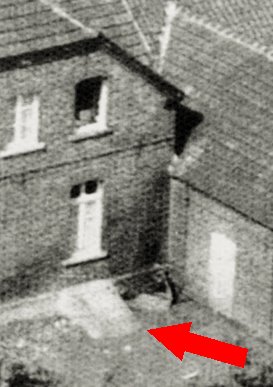
Not least of the speakers was an old man who was one of the children spared by John Kormann. For Kormann the incident had been a stand-out moment of clarity that coloured the rest of his life. For the boy, it was only one passing moment in a day marked by many moments of fear and uncertainty. He did not remember Kormann, but he remembered leaving the root cellar with the others and then being assembled outside while they were questioned and checked for weapons. Suddenly shooting broke out all around and they were hustled back into the cellar.
This re-eruption of fighting might have happened because the battle in Operation Varsity, as in many airborne drops, was particularly confused. Many British and American airborne units were dropped in the wrong place. They then spent hours criss-crossing the battlefield in every direction trying to reach their objectives. Many were deliberately dropped right on top of the scattered German positions. This meant they were everywhere on the battlefield, so German units were also criss-crossing the area attacking them, or looking for better defensive positions or for a way to escape the cauldron. Shooting could break out at any time, from any direction, as groups encountered each other and clashed.
When the shooting around the farm subsided, the boy and his group were again taken out of the cellar and again kept standing outside, until it happened again, and they were once again shoved back into shelter. And so the day went for the German children, with alternating fear and hope punctuated by horrors such as seeing the dead and wounded of both sides.
I felt privileged to be present at the plaque unveiling ceremony, but even more privileged to hear these first-hand accounts that so brought to life a historic day. Andrea Kormann Lowe performed wonders in organising both events, and in bringing together young and old, and former foes, to hear each others’ points of view. The memory of her father’s humanity could not have been more perfectly honoured.
Andrea Kormann Lowe has asked me to say that she could not have organised the memorial and the day without the inestimable help of Dr Andreas Wodarz and Jos Bex.
John Kormann’s autobiography “Echoes of a Distant Clarion: Recollections of a Diplomat and Soldier” was published by New Academia Publishing in 2007. The book can be bought on Amazon in the UK and the USA and elsewhere in the world.
The Scions of the 17th Airborne Division, Inc. is a non-profit organization founded in 2011 by 17th veterans for the children and relatives of anyone who served in the 17th Airborne Division during WW II, and for those interested in its history. Andrea Kormann Lowe commented: “The 17th Airborne Division was deactivated in September 1945. The Scions of the 17th Airborne Division, Inc. aims to honor the troopers of the 17th, and to keep its history alive, particularly as there are no longer serving soldiers, and sadly, soon no 17th Airborne soldiers at all. My strong hope is that the ‘Be Merciful’ plaque will succeed in making the war memorable for a younger generation.”
For other stories about Operation Varsity, see [here].
Since this article was written, a local man, Olaf Prinz, has bought the disused electricity transformer tower next to the Kormann plaque, and has converted it into an exhibition space where he has mementoes of Operation Varsity. For more information, and to visit, see [here].

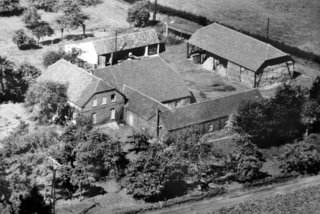
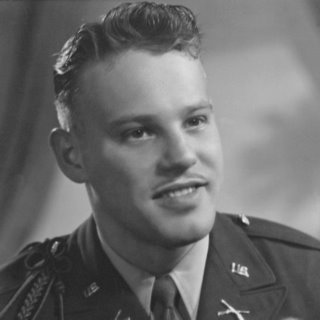
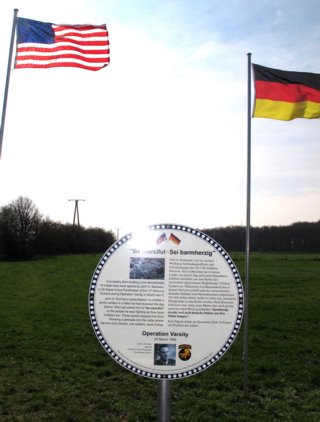
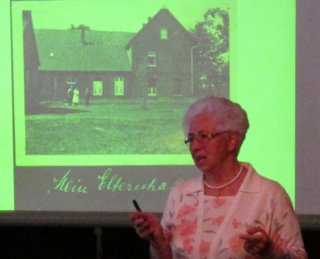
That is a stunning achievement by Andrea and a very fitting memorial to a fine act of mercy and courage shown by her father. it makes very happy reading out of a terrible situation
Christopher
The cruelty of war make villains of all of us.
I had the privilage of knowing John Korman.
A dear friend
Marvin
This is a fine, full and balanced account and conveys quite immediately -and as well as any I have read – the terror and privations experienced by civilians in time of war.
Thank you Ian for publishing this article on John Kormann. It has proved very useful for my research on John for the Second World War Experience Centre.
Thank you also for putting me in contact with John’s daughter Andrea which led to some great material.
Your efforts are much appreciated.
Thanks Amanda, happy to be of help.
Readers can find the SWWEC website here.
Thank you for this very informative article. God bless John Kormann for his bravery and foresight. My father, Derwood Clardy, was in the 517th Airborne Signal Company as well. I have been trying to find any information about his time in Germany. This article is very helpful.
Thanks Laura. You’ll find some information on the 517th in John Kormann’s book (see link at the bottom of the article above). The people to contact are The Scions of the 17th Airborne Division (also a link at the bottom of the article above). The Scions are mainly the children and relatives of men who fought in the 17th. I am sure they would welcome you. You could also try the “17th Airborne Division Family and Friends” Facebook group.
The Scions is where I found your article. They have been very helpful, even provided me with a contact of someone still living that served in the 517. Thank you for the link to family and friends, I will definitely look into that.
Relato interessante e humano de um dos períodos mais assombrosos da Humanidade.
Thanks Mario
Exceptional account of a remarkable event exquisitely refined to a pinpoint moment of a mother’s impact on her son… what a profound mercy… God bless John Kormann and God bless his wonderful mother who blessed her son with such empathy and compassion. I’ll never forget this pearl of beauty amid the devastation that encompassed it…
Thanks Mike